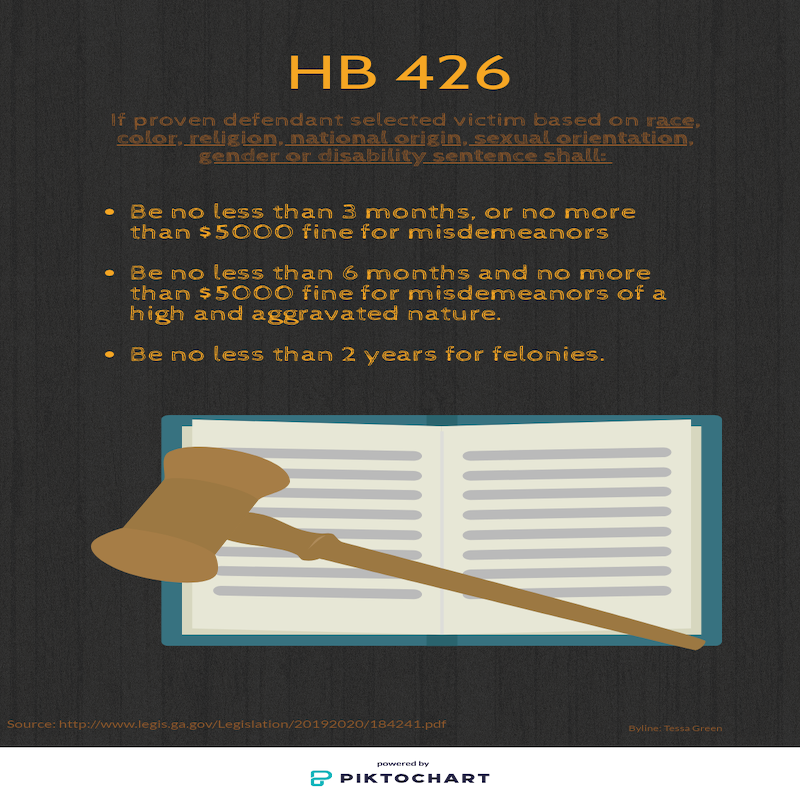The state’s first hate crimes bill, HB 426, passed the Georgia House but stalled in the Senate and will not be taken up until the next Georgia state legislative session in 2020.
Dacula Republican Rep. Chuck Efstration sponsored House Bill 426 in the most recent 2019 legislative session. HB 426 was the first bill in Georgia to include protections based on sexual orientation and gender to pass through either chamber of the General Assembly.
Why It’s newsworthy: Georgia is one of five states without a law protecting victims of hate crimes. Passing this legislation would be the first hate crimes bill since the last one was struck down in 2004.
Rep. Efstration says that HB 426 is currently in the state Senate judiciary committee. In order to pass the senate in the next session, the judiciary committee will have to call for a hearing and pass it through the committee.
Opposition
Reps. Houston Gaines and Marcus Wiedower, Athens Republicans, chose to vote against HB 426 in the Georgia House. After contacting both representatives to discuss their decision to vote against the bill, only Rep. Gaines responded.
Rep. Gaines made the following statement via email after declining an interview, citing his busy schedule as the reason he was unable to elaborate further:
“I gave great consideration to the hate crimes bill that came before the House, and I share the desire of the bill’s supporters to take a strong stand against crimes motivated by hate and bigotry. I voted against the bill in its current form because of two major concerns: 1. the sentencing components; and 2. the effectiveness of the bill. While the Senate did not consider this legislation in 2019, it does remain active in 2020.”
I look forward to working with our Senate colleagues and the Kemp administration on this piece of legislation and, as with every bill, remain open to changes and consideration through the process.”
Glennville Republican Rep. Bill Werkheiser said in an email statement that he voted against HB 426 because he doesn’t believe “any segment of society has greater value than others” and that the court system is already back logged.
Continued Support
The Anti Defamation League, or ADL for short, is working to ensure that the bill continues to push through the Georgia Assembly.
The ADL is a 100-year-old anti-hate organization that focuses on civil rights through educating the public, working with politicians, and working with police to investigate hate crimes.
Shelley Rose, associate director of the southeast regional ADL, worked closely with Rep. Efstration, drafting up several parts of HB 426. The group was able to gather a coalition of 30 organizations including the American Jewish Committee, the NAACP and the Georgia Alliance for Social Justice.
“This hate crime bill sends a message to victims that there are people who are here to support you and recognize that this is a serious crime,” Rose said, “and more importantly a message to the attackers that you will be punished to the fullest extent of the law.”
Effects of Hate Crime Legislation
A study done at Lagrange College in Georgia by political science professor John Tures found that the current five states without hate crime laws had a higher rate of violent crime in the year they collected data. The data was found using the Uniform Crime Reporting Data tool from the FBI.
According to Tures, district attorneys and law enforcement officials are in favor of hate crimes legislation because it helps them do their jobs more effectively.
Tures predicts that if the state of Georgia fails to pass the bill in the next session, cities will start passing their own hate crimes ordinances. Charleston, South Carolina is working to pass a bill to add higher penalties to hate crimes in the city. The bill was introduced after a church shooting in 2015.
Lagrange political science professor and author of the study, John Tures, says he plans to continue analyzing data related to hate crimes legislation this fall.
“I’m going to have my students look at it in the fall of 2019,” Tures said, “and I intend to let people know what we find.”
HB 426 would attempt to cut back on the number of hate crimes in the state by raising penalties “for crimes involving bias or prejudice” against race, color, religion, gender, disability and sexual orientation.
Some may wonder how a hate crime bill would change the criminal justice process in the state since there are already federal laws against hate crimes.
“The kinds of things which will be prohibited are already prohibited by us. What hate crime bills do is provide an extra penalty above,” said Charles Bullock UGA political science professor.
These penalties could include extra sentencing time or a fine of up to $5000.
While the bill did not pass during this legislative session there is a chance it could get picked up again in the coming years.
“What it needs… is somebody to carry the water for it. Some senator who will get behind and then be the primary sponsor on it,” Bullock said.
Deepening Discussion
For Hisham Qureshi, UGA religious department graduate assistant and coordinator of an interfaith panel, hate crime legislation is encouraging but finds it more important to open up dialogue.
I would ask the question… why we have this hate in the first place?”
Qureshi said a lot of hate he sees comes from misinformation, and a way to combat this is to educate others on different cultures and faiths.
Faristay Yamin, first-year UGA law student and member of the Muslim Student Association, said she sees both sides to the argument. The first is that hate is just a thought and we don’t want to punish thought crimes. The second side is that the perpetrator of a hate crime is more dangerous, and for that reason incarceration should be more serious.
Along with increasing sentence time for hate crimes, Yamin would like to see rehabilitation incorporated into the legislation.
“I do think people who commit hate crimes are inherently more dangerous than the average murderer,” Yamin said. “But if the purpose is to rehabilitate I don’t think when they get released they are going to be any less radicalized.”
Both Yamin and Qureshi see legislation like HB 426 as a start, but a think a deeper societal shift is what needs to happen.
“I mean, if you have to commit a hate crime well, it’s already too late,” Qureshi said.
Raphaëla Alemán, Tyree Brown, Jason Levenstiem, Morgan Nemec and Tessa Green are journalism majors within the Grady College of Journalism and Mass Communication.







